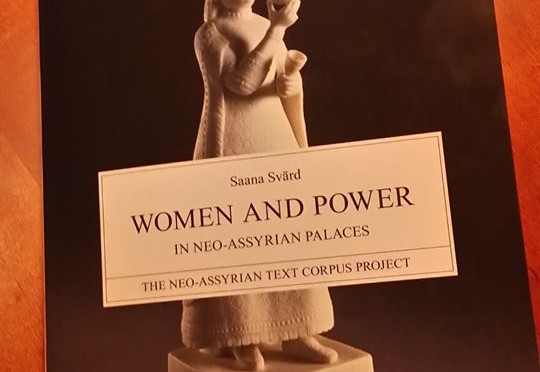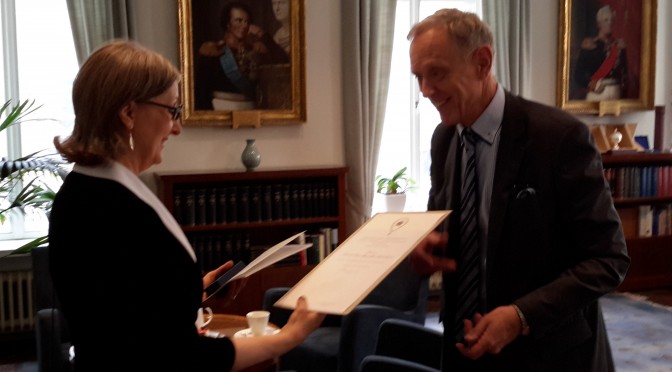Toimittaja Aarno Laitisen keksimä pilkkanimi ”päivystävä dosentti” toi yliopistollisen arvonimen kaiken kansan suuhun. Termillä Laitinen sohaisi paitsi epämääräisiä kommentteja latelevia ylipistotutkijoita myös – ja ehkä ennen kaikkea – laiskoja ja tietämättömiä median edustajia: Laitisen mielestä nämä eivät tahtoneet aina jaksaa paneutua sopivien asiantuntijoiden etsimiseen vaan pakottivat samat tutkijat kommentoimaan asiaa kuin asiaa. Moni tavallinen mediankuluttaja on kuitenkin ottanut Laitisen ivailun merkkinä siitä, että yliopistoväki on pääasiassa turhanpäiväistä joukkoa – dosentit etunenässä. Continue reading Dosentti päivystää henkimaailman asioita: Haastattelussa Hanne von Weissenberg
Reflections on Workshop “Functions of Psalms and Prayers in Late Second Temple Period Judaism” (Copenhagen, May 7-9)
By Jeremy Penner and Mika Pajunen
On May 7-9 scholars from Canada, Denmark, Finland, Germany, Norway, Sweden, the UK, and the United States gathered in Copenhagen for a workshop titled, “Functions of Psalms and Prayers in Late Second Temple Period Judaism.” The workshop took place under the auspices of the University of Copenhagen, Faculty of Theology, and was organized by Mika Pajunen, Trine Bjørnung Hasselbalch, Anne Katrine de Hemmer Gudme, Jeremy Penner, and Årstein Justnes. This workshop was part one of a two-part program, the second to be held in Helsinki on September 24-25 of this year.
Understanding Rhetoric and Hyberbole in the Hebrew Bible
Biblical scholars often treat idealistic expectations – for kings or eras – as “eschatological” or “messianic” expectations. Yet this sort of analysis often elides the rhetorical nature of the source texts. Messianism and eschatology are complex and important ideas, but they need to be carefully understood within the ways in which humans communicate with each other. Only when a broader rhetorical context is understood can particular concepts such as these be analyzed effectively, and thus appreciated on their own terms – why an author or a community found them appealing at a particular moment in time. I analyze the rhetoric of Obama’s first presidential campaign as a recent comparator, using Bormann’s Symbolic Convergence Theory and recent work on hyperbole. The results of this discussion are then applied to four sample passages from the context of Hebrew Bible to argue that idealistic or “utopian” language need not necessarily imply any of the ideas associated with messianism or millenarianism. In the final analysis this will mean that scholars must be more careful in delineating the diachronic development of ideas in ancient texts. Continue reading Understanding Rhetoric and Hyberbole in the Hebrew Bible
New Publication: “Women and Power in Neo-Assyrian Palaces”
Fresh from the printers! A new book written by CSTT-member Saana Svärd has just appeared in the series State Archives of Assyria Studies. Continue reading New Publication: “Women and Power in Neo-Assyrian Palaces”
Workshop Program: Ancient Jewish Cosmology – Sacred Time and Order (Jerusalem, June 15-16)
CSTT Workshop in Jerusalem, 15‒16 June 2015, at the École biblique et archéologique française de Jérusalem, co-sponsored by the Finnish Institute in the Middle East (FIME). Continue reading Workshop Program: Ancient Jewish Cosmology – Sacred Time and Order (Jerusalem, June 15-16)
The Origins of Satan in Judaism
Scholars looking to understand from where the figure of Satan derives have long appealed to Iranian influence, particularly in the form of the Zoroastrian Angra Mainyu (Ahriman). I argue instead that the first appearance of the term as a noun in the Hebrew Bible ought to be understood as an administrative official of the Achaemenid Empire. This continues a working hypothesis of mine that various aspects of the divine realm was envisioned as similar to the Achaemenid Empire by some in Second Temple Judaism. Continue reading The Origins of Satan in Judaism
Research through Passion and Collaboration: An Interview with Martti Nissinen
(for a Finnish version of this interview, please click here)
Martti Nissinen, Professor in Old Testament Studies at the University of Helsinki, is a world-renowned researcher whose expertise includes the study of historical prophetism, assyriology, and gender studies. Nissinen is the director of the Centre of Excellence in Changes in Sacred Texts and Traditions at the Faculty of Theology in Helsinki, which hosts over 40 researchers from various countries. I had a morning coffee discussion with him and got to know his path as a researcher.
Continue reading Research through Passion and Collaboration: An Interview with Martti Nissinen
Tutkimustyöhön intohimoa ja yhdessä tekemisen meininkiä: Haastattelussa Martti Nissinen
(for an English version of this interview, please click here)
Helsingin yliopiston Vanhan testamentin eksegetiikan professori Martti Nissinen on kansainvälisesti menestynyt tutkija, jonka erikoisaloja ovat muun muassa historiallinen profetiatutkimus, assyriologia ja sukupuolentutkimus. Nissinen johtaa vuosina 2014–2019 teologisessa tiedekunnassa toimivaa yli 40 tutkijan huippuyksikköä. Tutustuin aamukahvin äärellä tarkemmin savolaiseen professoriin ja hänen polkuunsa tutkijana ja yhteiskunnallisena vaikuttajana.
Anneli Aejmelaeus Receives Medal of Honour
For the Finnish version of this blogpost, see here.
The President of the Republic of Finland granted on the most recent Finnish Independence Day (6-12-2014), the First Class Medal of the White Rose of Finland to Professor Anneli Aejmelaeus. Continue reading Anneli Aejmelaeus Receives Medal of Honour
Anneli Aejmelaeukselle kunniamerkki
Tasavallan presidentti myönsi viime itsenäisyyspäivänä 6.12.2014 professori Anneli Aejmelaeukselle Suomen Valkoisen Ruusun 1. luokan ritarimerkin. Continue reading Anneli Aejmelaeukselle kunniamerkki








